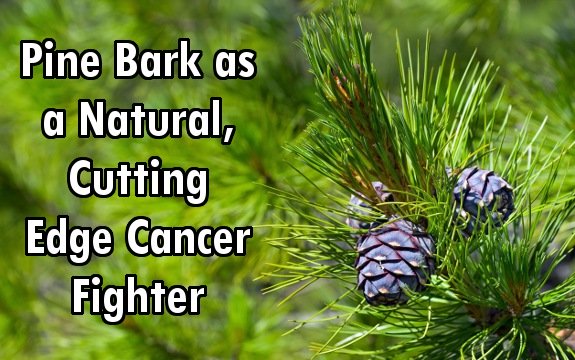Studies Show Pine Bark as a Natural, Cutting Edge Cancer Fighter

 Many foods can fight cancer, and none should be overlooked, but one tree as old as the Egyptian pyramids provides an ample source of bioflavonoids which can help fight cancer with no nasty chemotherapy side-effects. Pcynogenol, derived from pine tree bark, the French Pinus pinaster, is full of vitamins and minerals which the body needs to stop cancerous tumor growth and stave off inflammation.
Many foods can fight cancer, and none should be overlooked, but one tree as old as the Egyptian pyramids provides an ample source of bioflavonoids which can help fight cancer with no nasty chemotherapy side-effects. Pcynogenol, derived from pine tree bark, the French Pinus pinaster, is full of vitamins and minerals which the body needs to stop cancerous tumor growth and stave off inflammation.
Pcynogenol is a patented blend of bioflavanoids (that are naturally available as well) that boosts immunity and fights cancer in numerous forms. It has been proven to cause apoptosis in breast cancer cells, and the necrosis (death) of other cancer cells in multiple patients.
“These results suggest that pycnogenol selectively induced death in human mammary cancer cells (MCF-7) and not in normal human mammary MCF-10 cells.”
“The ability of pycnogenol to inhibit NF-kappa B activation and VCAM-1 and ICAM-1 expression suggests that this phytochemical may play an important role in halting or preventing the atherogenic process.”
Pcynogenol also scavenges the body for free radicals, which leads to all forms of disease, and also mitigates cardiovascular disease by relaxing the vaso-reponse in the body and increasing capillary permeability. Preliminary studies are underway to see if pine bark compounds will help treat diabetes, osteoarthritis, attention deficit disorder, and erectile dysfunction with promising results.
Read: Garlic Proven to Kill Brain Cancer Cells
“PBE rich in polyphenolic compounds has been shown to cause endothelium-dependent vasorelaxation and decrease the amount of circulating inflammatory substances in the blood stream. Intake of PBE is useful in order to reduce the risk of heart disease and is effective in the treatment of chronic venous insufficiency and retinal micro-hemorrhages venous disorders.”
The active compounds in Pcynogenol are oligomeric proanthocyanidins (OPCs) as well as several other bioflavonoids: catechin, epicatechin, phenolic fruit acids (such as ferulic acid and caffeic acid), and taxifolin. Procyanidins are oligometric catechins found at high concentrations in red wine, grapes, cocoa, cranberries, and even apples.
The same phytonutrients which keep the pine tree ever-green can help keep the body full of life and health. High levels of flavanoids, vitamin C, and bio-active ingredients can help keep everything from cancer, to obesity, arthritis, and eczema at bay. Pine bark has also been shown to hold promise in treating HIV.

Good information but just FYI – it is spelled Pycnogenol.
Been using it for years, since 1995.
Yes pine bark is very effective on cancer cells and other illnesses.